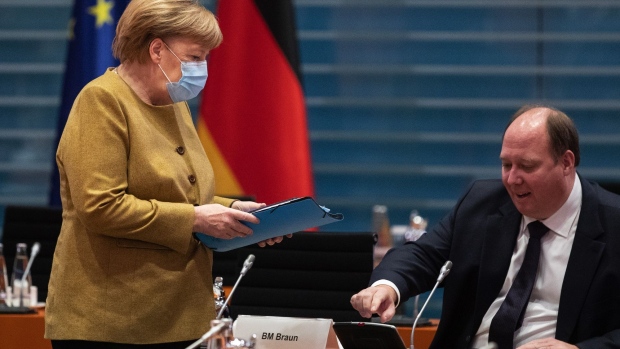Jan 26, 2021
Merkel Ally Wants More Debt Spending to Fund Pandemic Fight
, Bloomberg News

(Bloomberg) -- Chancellor Angela Merkel’s chief of staff proposed temporarily allowing expanded debt spending by Germany’s federal government, prompting a swift rejection from officials in his own party.
Helge Braun, Merkel’s chancellery minister, wrote in Tuesday’s Handelsblatt newspaper that the country’s so-called debt brake, which is enshrined in the constitution, should be altered to allow more borrowing to help offset the impact of the coronavirus on Europe’s biggest economy. The brake -- designed to prevent new borrowing exceeding 0.35% of economic output -- was already suspended for 2020 and 2021, with Merkel’s government making tens of billions of euros available to help businesses hurt by the pandemic.
At the same time, Braun said there should be a mechanism for reducing new borrowing progressively “in the coming years” and a “clear date for the return to compliance with the debt rule,” which he said is “indispensable for Germany and an obligation to future generations.”
“The debt brake cannot be adhered to in the coming years, even with otherwise strict spending discipline,” Braun wrote. “Given the experience of the European sovereign debt crisis and the financial impact of the pandemic on national budgets in Europe, this is not an easy decision.”
His comments, which appeared to water down the traditional commitment to financial discipline held dear by the conservative bloc, suggest the chancellery is increasingly concerned about the potential impact of faster-spreading variants of the coronavirus, and the resulting impact on the economy and Germany’s spending plans.
Braun’s proposal was immediately shot down by Eckhardt Rehberg, budget spokesman for Merkel’s CDU/CSU parliamentary caucus. Rehberg dismissed the minister’s comments as a “personal opinion” and said the caucus firmly backs the debt brake and “solid finances are non-negotiable.”
“It is deceptive to assume that current low or negative interest rates are permanent,” Rehberg said in an emailed statement. “If interest rates rise again, high debt means high risks for future budgets.”
Germany’s political parties are positioning themselves for the post-Merkel era -- the chancellor will step down after September’s election -- and borrowing rules will be at the center of the debate over how to secure high levels of investment in environmental and technological change while keeping debt under control.
The Greens, seen as the most likely coalition partner for the CDU/CSU after the vote, have also called for a loosening of the debt brake and want to bring it to the table in any negotiations on forming a government.
‘Bad Example’
Finance Minister Olaf Scholz, who is the Social Democrat chancellor candidate for the election, has said the government aims to restore the borrowing limits in 2022, while also making clear that there are budget holes in coming years which will need to be plugged.
Economy Minister Peter Altmaier, a member of Merkel’s CDU party, said Tuesday he was skeptical about any changes to the debt rules. Alexander Dobrindt, head of the CDU’s Bavarian sister party in the Bundestag, said loosening the constraints would set a bad example to Germany’s European Union counterparts.
“If Germany gave the signal to open the floodgates by abolishing the debt brake, it would have a significant impact on the financial behavior of our European partners,” Dobrindt told reporters in Berlin. The instrument should remain in place, including the current possibility of suspending it in times of national emergency, he said.
New federal debt was just over 130 billion euros ($158 billion) last year, and is set to rise to as much as 180 billion in 2021.
(Updates with comments from Altmaier, Dobrindt)
©2021 Bloomberg L.P.






